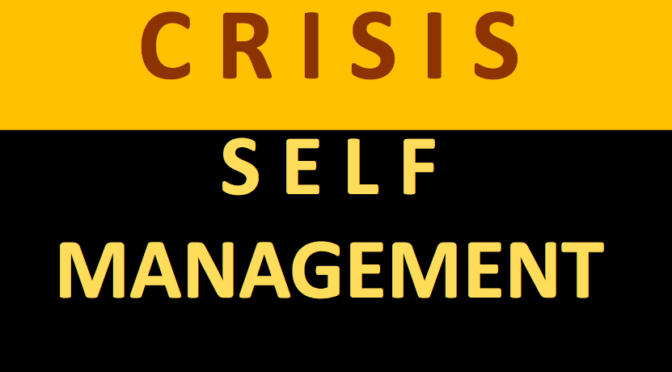“You’re fired.”
“We are letting you go.”
“You are being transitioned.”
“You’re being furloughed.”
“We are laying you off.”
“We’re going in a different direction.”
“We aren’t renewing your contract.”
It doesn’t matter how its said. It always means the same thing.
Your job with that employer is over.
Your paycheck stops. Your benefits are over. Your daily routine changes. You have to leave fellow employees you have become close with. Your future becomes uncertain. Your financial situation may be put in distress. You may feel emotionally traumatized. Your focus is suddenly and violently redirected. And you have to deal with a range of emotions.
And at the end of the day the reason is almost meaningless unless you did something wrong.
When you are let go, here are things you can do to cope and start moving on.
Believe in yourself
It is easy to become fearful or worse, angry and bitter, when you are terminated. When this happened to me a few years back, I immediately imagined losing our house, not being able to send my kids to college, not being able to buy food etc. You can easily go to a dark place very quickly.
However, those emotions are counter-productive to your progress.
Remind yourself of your talents, characteristics, experience and knowledge that you have gained.
You got the job in the first place. You have proven you can learn and grow. And you can do it again.
Let that boost your confidence as you begin the process to re-group and find a new job.
Refresh your faith
When bad circumstances happen to us we need to return to our true foundation, our faith in God.
Remind your self with scripture that God has a plan for each of us and a job change, even un-planned, can be a part of a greater process for your development and growth. God can use trying times to deeping your faith and lead you to even better circumstances and personal growth.
Renew your committment to prayer, scripture reading and engaging with your church community. In doing so you will find encouragment and motivation to move ahead.
Engage your family
When this happened to me, my family was unbelievably supportive. We all sat down and talked through what had happened. Even with the kids. I involved them all in the process of reacting to and beginning to move on to something else.
My family helped me process what had happened. They talked to me. They helped me brainstorm ideas. They helped me with new contacts for potential jobs. They encouraged me. They prayed for me.
If you, because of fear, embarrassment or anger, shut off your family from participating in the process you are eliminating a strong source of support and encouragement.
Embrace your network
In today’s environment, the importance of your network cannot be overstated. It is most likely that your next job will come, directly or indirectly through your network.
You should always be building your network. And when you are let go from your job, lean on your network. Inform them.
I recommend you send individualized messages to people in your network. Ask them if they know of any opening or any one in their network who may know of any openings.
The day it was announced that I was let go, I notified 61 people in my network individually that night. I received lots of support and numerous leads which I immediately started following up. And that immediate effort got my mind off of the negatives of the situation and it got my transition off to a good start.
Resist making network wide posts. These are easier and may invoke sympathy from your connections but do less for you than individualized direct messages and conversations where you can reconnect with people you know and get advice and leads.
Become future focused
Its easy to spend a lot of time focusing on what happened and why and try to assess blame. It can be cathartic to work through that for a time. However, only thinking back will not prepare you for the future.
Decide to discipline your mind to leave the past behind and to focus on your future. Learn what you need to and laser focus on your activities needed to move you forward.
You now have a new opportunity.
You have a chance for a clean slate, a start over in a new job or even a new career if you so choose. Focus on that. Pour your energy and effort into that. Your new future awaits.
Mind your intake
Make sure you monitor what you read and listen to.
Focus on content that helps you move forward.
It is easy, especially during difficult times to succumb to allowing too much negativity to influence and further drag you down.
When I was let go, I watched very little news media. The last thing I needed was to be reminded of how high the unemployment numbers were. Most of the news is negative anyway and it won’t help your frame of mind.
Focus your content consumption on leads, connections, industry information for your area, skill building, motivation and renewal.
Take time to read some of the books on your reading list to grow your knowledge or skill set.
Take some online courses on Udemy, Coursera or LinkedIn Learning to brush up on or gain a new skill.
Find a meet up in your area that has subjects of interest.
All of these types of content will help you, and make you more informed for the next interview you have.
Make it a game
When this happened to me I started tracking my own stats like a baseball player would.
I made a spreadsheet and tracked the number of emails/messages, phone calls, resumes submitted, jobs applied for and recruiters I had engaged with. These numbers became my job search KPI’s. I was tracking the activities that I know would eventually result in me finding a new job.
Having my own personal job search KPI numbers I could update and review each day motivated me to keep going, to keep making the calls and sending the emails etc.
Takeaway
Putting effort into these activities will help you re-focus and transition after the jolt of being let go.
Put all your effort into that. The momentum of this effort will help you deal somewhat with the pain and frustration of the situation.
Look forward and embrace a better future.
Note: Observant readers will notice I actually have seven ways not six. Well, I edited this post after I published it and didn’t want to change the title. So you get one for free. Who doesn’t like a free bonus?









